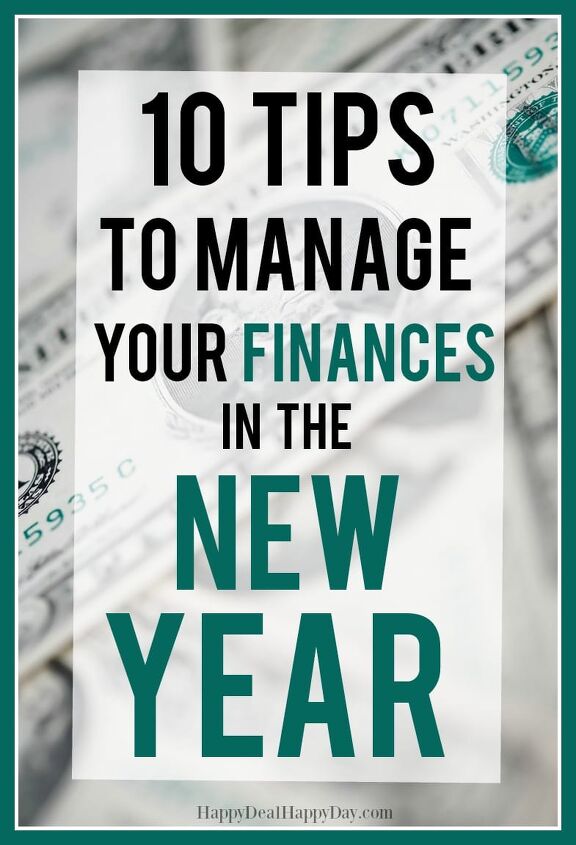10 Tips to Manage Your Finances In The New Year

*This is a sponsored post. All opinions are my own!
Welcome 2022! I’ve never been so excited to see a new year come than this year!!!! (also said the same thing last year, and I will say that 2021 was way worse for me than 2020 in many areas (also more wonderful than 2020 in a bunch of other areas,) – so we’ll see……..)
A new year brings in our minds a clean slate and we find areas in our life where we can start fresh. Maybe we can even have hope that life will get back to normal sooner than later. If you need to start fresh in managing your finances in 2021, then these 10 tips are sure to help.
1. Set Up and STICK To Your Budget
If you don’t know where your money is going each month, then it will be impossible to set financial goals, pay off debt, or know when you are overspending. I absolutely love having a budget because of the FREEDOM it gives me! If I buy a gift for someone, or a new pair of jeans for myself, I don’t feel guilty because I know those purchases are allowable and I’m not breaking the bank.
For our personal budget, we have a basic excel spreadsheet, and I manually type in receipts into each category and keep track of what we have spent. You can try free budget apps like Fudget or Mint: Personal Finance & Money to help you get started. Sticking to a budget is not as time-consuming as it sounds, and it brings so much peace to your household when you know where and how every penny you earn is being spent.
I have a 20 Day Budget Challenge you can sign up for to get lessons via e-mail – so jump on board for a refresher! Come and join our Facebook Group for discussion!
2. Complete this 20 Day Budget Challenge
(Wait, didn’t she just mention the 20-day budget challenge??) Yes I did! And I’m going to mention it again because, for the next month, you can read nuggets of financial wisdom each day in your inbox, to inspire you to get your finances in order. I will be sharing about topics such as breaking bad spending habits, learning how to save on entertainment, planning your emergency fund, using coupons, and 16 more days worth of some great budgeting tips to take control of your finances!
3. Being Mindful of the Pros and Cons of “Retail Therapy”
Let’s face it – going out and bringing home a new item you’ve had your eye on is a good feeling. Many of us who are avid couponers and deal hunters get a nice “coupon/deal high” when we score something with amazing savings compared to the retail price. (I’m guilty of this on Dec. 26th each year to get Christmas items on clearance!) This is fun and even therapeutic! It can also be very helpful for your personal finances when you can bring home necessities for a fraction of the usual cost.
The con comes in when you just buy and buy and buy, just because it was a great deal, but the item serves no real purpose. We can sometimes use the excuse of “stockpiling” when really it is “dust collecting.” Don’t bring home a great deal for the sake of a great deal just to get that money saving “high.” Plus if you are currently on a plan to pay down debt, then retail therapy is not your friend. It’s temptation causing you to purchase something you probably don’t really need, in turn for a feeling of gratification that is not long lasting. In the end, you could just be putting yourself in deeper debt. (similar to being on a diet – and consuming dessert when you know you shouldn’t.)
So if you are in need of some retail therapy then ask yourself this question:
- Is there money in the budget to pay for this and what is the purpose of this item? If I’m dying to get out of the house and go shopping, and I know that I personally don’t need anything, then I’ll purchase gifts (even for Christmas) all year long. That way if I find a good deal, and don’t need it (which is probably most of the time), then perhaps I can purchase an item as a gift I needed to purchase anyway. I actually use a gift buying spreadsheet that you can find in this post on how Planning Ahead Can Save Big. That way if I want to use shopping as entertainment, and want that money saving / good deal “high”, then I make sure it is for something I need to buy. It’s nice because then your deals are for giving – and giving is a great feeling.
4. Giving Should be a Regular Line Item in your Budget!
Speaking of giving, you should pick a local church, charity, or organization that you regularly support. What you sow is what you reap! I had a friend recently who got an amazing deal on a pair of designer boots that she scored at Macy’s. Then her and her daughter went to visit some homeless people around the holidays, and inevitably, gave her boots away. She also bought another person some dinner. Two days later she ended up getting a bonus at work that was the same amount she gave away that previous weekend. Out of the goodness of her heart, what she gave, came back to her.
Personally, I regularly sponsor a child through Hope Beyond Today. The missionary family that runs this organization are good friends of mine, and I traveled to India myself and visited the schools they support. This organization is near and dear to my heart, so if you are looking for a place that helps kids in need – here is one I highly recommend!
Not only is giving a good feeling, but there is also that awesome tax deduction on charitable giving. Even if giving doesn’t make you feel good emotionally (which I guarantee it will), you also get a tax break!
5. Go on a Spending Freeze
Think of this as a short term money diet. Maybe your New Year’s resolution can be for 30 days to not spend money on any extras except your bare necessities and bills. Even limit your groceries – make a menu based off of what you already have on hand in your freezer and pantry. Make a game out of it – see how many meals you can squeeze out without having to go to the grocery store except for produce and milk. Then any money you save, apply that to debt or put it toward a big-ticket item you want to save for. You’ll start off the year already being ahead of the game!
6. Pay for Big Ticket Items Only When You Have the Cash To Pay In Full
Paying for interest is just like throwing money in the garbage. My husband keeps reminding me that if we pay off our mortgage early, we will gain $42,000 that we would have paid in interest. That would be a very nice chunk of money for our daughter’s college funds! Credit card debt is the worst because interest rates are just so high. Even if an item is a great deal, don’t buy it on a credit card if you can’t pay it off the next month, or you’ll lose the savings on credit card interest! (I only recommend using credit cards for the cash back rewards if you pay it off monthly – see tip
We also save up cash for our cars. My wise father always told me that you will always have a car payment – just make the car payment to yourself instead of a bank to avoid interest. By “paying ourselves” monthly in a savings account, we can save up enough money to pay for a used car in cash. That way, we hopefully never have to pay interest on a car.
7. If you do Use Credit, Be Sure to Pay it Off Each Month and Use a Card With Good Rewards
Our rule in our family is that if we don’t pay off our credit card each month, then we need to cut it up. (Unless of course there is a true financial emergency that can’t be avoided.) We use our credit card for virtually every purchase we make in a month. The reason being is that we get 1-5% cashback if we use it. That means our credit card pays us each month to use it! We usually get an extra $30-$80 a month that we can put toward other financial goals. I know this tip is not for everyone, and some of you with large amounts of debt need to stay away from credit cards. But for those of you who can stick to paying it off monthly, it really can be beneficial to your budget!
8. Menu plan
Take a quick inventory of ingredients you have on hand, and jot down meals you know you can prepare with minimal extra spending at the store. This could come in real handy for a month-long spending freeze. Then get out a blank calendar for this month, and create a menu for you and your family. There are plenty of these menu plans actually already done for you – just search on Pinterest! Here is one I made for Wegmans shoppers – Spend $150 on 20 Make Ahead Freezer meals. You should also check out MyFreezEasy – an app that will meal plan for you for the entire year!
9. De-clutter and Organize
Whether its the stack of bills laying on your counter, your pantry, or your closet – each area will save you money if it is organized.
Have a system in place for dealing with mail and paying your bills. Make dinner using items already in your pantry, instead of stocking up on more. Donate clothes you haven’t worn in 12 months. Even sell some items on Ebay or the Facebook marketplace and make a few extra dollars.
10. Have a plan to pay down debt.
Debt! Most of us have it. Cars, houses, and private student loans are just a few of the more common debts people hold. It can definitely be overwhelming and feel like such a heavy weight. Having a concrete plan is paramount in reducing that weight. Debt won’t magically go away. The weighty feeling may also be holding you back from doing something about it.
Not sure where to begin? Here is a plan for Paying Down Debt that can help you get your plan on paper, and get the ball rolling closer to freedom.
If reading these 10 tips has left you feeling overwhelmed, then I suggest that you break this information down and pick one tip to focus on a month. A year from now, you’ll be amazed how much better off you are financially!
Find more frugal tips resources over here!




















Comments
Join the conversation